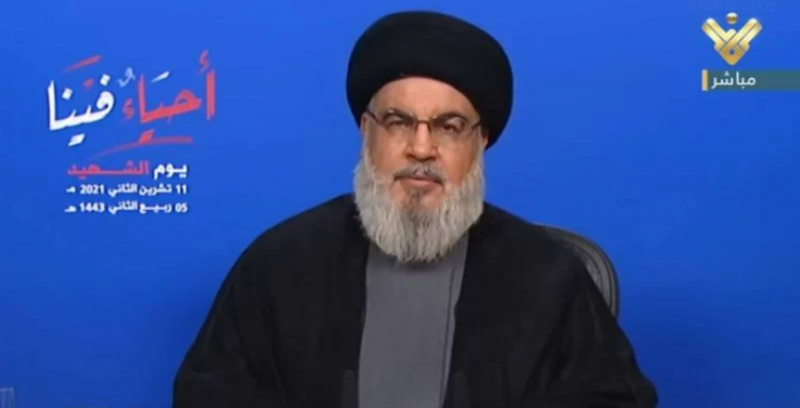
Hezbollah leader Hassan Nasrallah on Nov. 11, 2021 during his televised speech broadcast live. (Screenshot /al Manar)
Hassan Nasrallah broke his silence regarding the continuing diplomatic rift between Lebanon and Gulf countries on Thursday, blaming Saudi Arabia for purposely instigating the spat. The Hezbollah chief in a televised speech said that Saudi Arabia had retrieved the interview in which Lebanon’s Information Minister George Kurdahi criticized the kingdom’s involvement in the Yemen war with the direct intention of initiating the crisis. He added that Saudi Arabia's response to the footage was highly exaggerated and reiterated Hezbollah’s support for Kurdahi amid calls for the minister to resign in order to ease tensions with the Gulf. Kurdahi’s remarks, aired on Oct. 25, prompted four Gulf countries — Saudi Arabia, Kuwait, Bahrain and the United Arab Emirates — to recall their ambassadors from Lebanon, while Saudi Arabia also placed a ban on imports from Lebanon. Saudi Arabia has long been a vocal opponent of Hezbollah, which is armed and financed by Iran, a major rival of the kingdom. Earlier on Thursday, Prime Minister Najib Mikati again highlighted the need to prioritize the “general interest” in finding a solution to the diplomatic rift, but did not explicitly mention Kurdahi while stressing the importance of preserving “fraternal relations” with Saudi Arabia. Nasrallah’s speech took place in tandem with a football World Cup qualifier played in Saida, in which Iran claimed a 2-1 victory over Lebanon.
Lebanon's first sexual harassment trial since the act was criminalized in the country last year was postponed on Thursday due to a court employees’ strike. Lawyer Ayman Raad, who represents five women who brought complaints against film director Jaafar Al Attar in May, told L’Orient Today that the case was postponed until April 4, 2022. In May this year, dozens of women began sharing testimonies of sexual harassment at the hands of Attar with local media and on social media, which prompted a police investigation into the claims. Attar has denied the allegations and maintained his innocence. A landmark law criminalizing sexual harassment was passed by Lebanon’s Parliament in December. Under the law, perpetrators could spend up to four years in prison and pay fines up to 50 times the minimum wage.
Over a year since the Beirut port explosion destroyed half of the capital, officials announced the first project to be launched out of a reconstruction fund created by a group of international organizations. The program, which aims to provide grants of up to $25,000 to more than 4,000 small businesses within a 5-km radius of the port and with 20 or fewer employees, will be overseen by financial company Kafalat which assists small- to medium-sized businesses in Lebanon. In December, the United Nations, the World Bank and the European Union unveiled the Lebanon Reform, Recovery & Reconstruction Framework (3RF), at the heart of which is a World Bank-managed financing facility intended to direct donor funds to initiatives that include repairing damaged buildings, businesses and infrastructure. The initiative set out to raise approximately $2.58 billion for post-Beirut blast recovery and reconstruction costs over a year and a half, but payment of $2 billion of the amount was contingent on government reforms, which have yet to be implemented.
United Nations Special Rapporteur on extreme poverty and human rights Olivier De Schutter is set to hold a press conference at 11:30 a.m. today, wrapping up his two-week visit to Lebanon. De Schutter has spent the last two weeks conducting an assessment on the Lebanese government’s response to the economic crisis and has held meetings with several officials including from the foreign, energy, education and economy ministries as well as Banque to Liban Gov. Riad Salameh. Lebanon’s economic meltdown has been ranked by the World Bank as one of the worst since the industrial revolution, and has plunged some three-quarters of the population into poverty, according to UN figures.